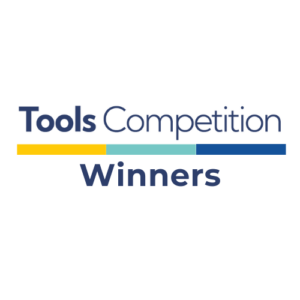
We are pleased to announce the 16 finalists named in the Facilitating Learning Science Research track of the 2023-24 Tools Competition!
In this track, 116 teams submitted tools that facilitate the learning science research process to improve K-12 learning interventions and expand the learning engineering field’s knowledge of what works for learners.
Tools in this track are designed to support a range of research needs and engage broad types of researchers—spanning academic researchers, teachers conducting research, and schools engaging with data and evidence. We saw innovations that leverage large language models, generative models, and artificial intelligence to improve our understanding of learning, tools that expand research on K-12 math learning, and proposals that focus on bringing the learning science research community unique, comprehensive datasets.
This track is run in partnership with the Bill & Melinda Gates Foundation and Jacobs Foundation.
Read on to learn about this year’s finalists. Winners will be announced in summer 2024.
Catalyst Award Level ($50,000) for early stage ideas or products.
- DREAM VR Research Manager | New York University (United States)
DREAM VR Research Manager provides tools that support scientific studies on learning with virtual and extended reality. Learn more on their website.
- Insights* | Submitted as an Individual (Germany)
Insights* bridges the gap between educational science research and practice by fostering collaborations and knowledge exchange between researchers and school communities.
- Plan Forward: Taking the Guesswork Out of Planning | Burkonda Inc (United States)
Plan Forward is a software tool that uses advanced data analysis to suggest data-informed priorities, SMART goals, and strategies so districts can create annual plans that support all students’ continuous learning. Learn more on their website.
- ReSource: Empowering A/B Testing in Educational Environments | Playpower Labs (India)
ReSource enables educators to easily run A/B tests in digital learning environments and rapidly discover what works in the classrooms. Learn more on their website.
- Student Work Benchmark | Teaching Lab (United States)
Student Work Benchmark seeks to improve the ability of LLMs to understand student work in math by developing an open source visual benchmark made up of images that mix numbers, figures, and handwriting. Learn more on their website.
- Teaching Advisor | Vanderbilt University (United States)
Teaching Advisor is a conversational agent that will help educators navigate a large corpora of research findings and discover usable, research-backed practices applicable to their specific needs.
Growth Award Level ($150,000) for products with some users and scale.
- CTAT++: Easing Creation of Intelligent Tutoring Systems | Carnegie Mellon University (United States)
CTAT++ enables non-programmers (e.g., teachers) to create their own intelligent tutoring systems, a proven kind of adaptive learning activity with step-by-step coaching. Learn more on their website.
- Discussion-Based Learning Platform | Submitted as an Individual (Norway)
Discussion-Based Learning Platform pioneers the integration of open science principles in education—facilitating scalable implementation and equitable access to research-based interventions. Learn more on their website.
- School Impact Platform | ImpactEd Group (United Kingdom)
School Impact Platform is a simple to use, research-based evaluation platform, helping schools and those working with them to generate better evidence about what works for learners in their context. Learn more on their website.
Transform Award Level ($300,000) for established platforms with 10,000 or more users.
- AI Research Assistant: Talk to Teachers | EIDU (Germany)
EIDU’s researcher platform will be expanded to enable direct survey publication to teachers in lower income countries with real time results, along with an AI research assistant able to embody the voice of the teacher. Learn more on their website.
- Automated Pre-/Post-Testing in Kolibri for Offline Learning Environments | Learning Equality (United States)
Learning Equality’s tool enhances educational assessments in low-resource, offline environments through automated generation of balanced pre- and post-tests, drawing from a vast question bank that is supplemented by AI, and is aimed at allowing the correlation of standardized test data with learner activity for continuous learning improvement and research. Learn more on their website.
- Faster ForWord | Carnegie Learning, Inc. (United States)
Faster ForWord will connect Fast ForWord—a product designed to improve early reading and cognitive skills—to the UpGrade A/B testing platform, enabling it to work with researchers and educators studying how manipulating Fast ForWord exercises can optimize learning paradigms and exploring how optimization varies by task (perceptual vs. conceptual) and student (demographics). Learn more on their website.
- Schola.AI | Third Space Learning (United Kingdom)
Schola.AI is aimed at research teams and institutes who are looking to explore and experiment with large data sets of math tutoring practice—providing them with access to a specialized and fine-tuned LLM with an API to query and experiment both with TSL’s data-set of 2 million hours of math tutoring, as well as third-party math tutoring data, thus expanding the possibilities for researchers to work with a real/live learning environment, innovating in human and AI/augmented tuition in order to close the math-achievement gap at scale. Learn more on their website.
- Terracotta Messages | Indiana University (United States)
Terracotta Messages is a new, integrated service in Terracotta (Tool for Education Research with RAndomized COnTrolled TriAls) that will allow teachers and researchers to experimentally manipulate personalized messages sent directly to students (e.g., announcements, encouragement, reminders, nudges, etc.). Learn more on their website.
- Towards Personalization for Misconception Diagnosis: A Platform for Improving Question and Distractor Generation and a Recommender for Personalized Assessments | Eedi Ltd (United Kingdom)
Eedi will build AnSearch, a tool connecting learning engineering research to K-12 math instruction consisting of two key components: AnSearch:Forge for the evaluation and iterative improvement of questions and distractors generated by prompting LLMs; and AnSearch:Recommend for suggesting personalized questions and distractors to better diagnose misconceptions for individual students. Learn more on their website.
- Upskill@Instill: Building a Database to Transform Teaching, Learning, and Leadership in Every African Classroom | Instill Education (South Africa)
Upskill is an integrated omni-channel, mobile-friendly platform designed by Instill Education to support educators across Africa throughout their professional and personal journeys—making learning accessible and tailored to their needs. Learn more on their website.
See finalists for all tracks here.
The Tools Competition has three phases and multiple award levels to help winners create or enhance their tools. In this current third and final phase, finalists will pitch their tool before a panel of judges who will nominate winners of the competition.
The Tools Competition has previously named 80 winners from 35 countries who are impacting more than 107 million learners worldwide.
The 2023-24 Tools Competition is supported by: Schmidt Futures, Griffin Catalyst, Walton Family Foundation, Bill & Melinda Gates Foundation, Siegel Family Endowment, DARPA, Ballmer Group, Calbright College, Axim Collaborative, Jacobs Foundation, Endless Network, and OpenAI.
Join our mailing list to receive updates on the next competition cycle—launching September 2024!



